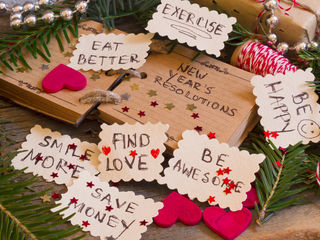Motivation
How to Make Your Resolutions Successful
Here's why your goals are difficult to stick with.
Posted January 27, 2020

If you've made a New Year's resolution, you're not alone. Sixty percent of Americans make resolutions. And the most common one (made by 71 percent of people) is going on a diet and eating healthier. And then the second most common one, 65 percent of people pledge to exercise more.
The sad news is that after just one month, only 25 percent of the people who made a New Year’s resolution are on track to keep their resolution. And as time goes on, that number falls even more. In fact, only 8 percent of people keep their resolutions by year-end.
Why is that? We all start with such good intentions. But few of us actually try to determine if we're really ready to fulfill our New Year's pledge. Readiness to change has to do with knowing what resources and knowledge you need in order to make a lasting change successful. And I don't think most of us stop and think about whether or not we are ready to make a change. We get caught up in the excitement of the New Year and making these resolutions and writing them down. And we think that's going to take us where we need to go.
I’d like to give you just a short exercise to help you determine your readiness for change. Here is the list of the different stages of change.
The first one is the pre-contemplation stage. With this one, it’s like you have your fingers in your ears and you're chanting la-la-la-la-la-la because you don't want to hear about it. You're either in denial or you don't even realize you have a problem.
The second phase is the one of the contemplation stage. This stage can be described as a “yeah but” phase. That’s where you say, “Yeah, I want to change my diet… but I can’t take time to cook.” Or, “Yeah, I want to exercise more, but I have to work and I don't have money to do this.” Or, Yeah, but…something else gets in the way. So the contemplation phase is a “yeah but” phase. You may be just feeling ambivalent about making the change or emotionally conflicted as to whether or not you should make a change.
But that's important to know because if you are in these stages, it's unlikely that any resolution you make will really stick.
Now let's get to the preparation stage. In this stage, you’re ready to stick your toe in the water. You may be collecting information, you may be talking to people about the change you want, you may be reading about things you need to know, or you may even be making small changes already. That's a good thing.
The last stage of change that I want to discuss here is the stage of change called the action stage. In the action stage, you've already jumped off the cliff and you're ready to go.
You can't force yourself to change if you're not ready. That's really important. I want to say it one more time. You can't force yourself to change if you're not ready. But there are some steps that you can take.
First of all, if you're in that pre-contemplation, that's the la-la-la-la-la, try to rethink your behavior. Think about how your behaviors are affecting you, and what the risks are if you continue with those behaviors. Those are behaviors like binge eating, compulsive overeating, food addiction, and emotional eating. If those are behaviors that you're wanting to change, just start to think about how those behaviors are impacting your life. And that may enable you to be more motivated so that you can be more successful.
If you're in the contemplation phase, you can weigh the pros and cons of your behavior and see if you can identify what's standing in the way. What are the obstacles that are standing in the way to you making a successful change?
Let’s look at a few ways to reframe your Resolutions:
1. Instead of going on yet another fad diet, make 2020 a NO DIET year. Instead of a radical change in your eating, take a small step each month towards making changes. It could be taking a cooking class or making a commitment to take your lunch to work rather than eating out of the machine.
Or maybe you want to try one of the food delivery services that offer you recipes and fresh food on a weekly basis. Many people have trouble finding time to cook or are too tired at the end of the day to cook.
Instead, you may want to set aside one day a week to cook in advance and freeze some meals. You can make up stews or soups for example and portion them out so you just have to go into the fridge to warm up your meal. Add side dishes like pre-prepared salads from the health food store or a side of veggies.
2. Instead of starting an exercise program to lose weight, think about all the types of physical activity you would like to experience—maybe you want to take a kickboxing class or you’ve been thinking about taking dancing classes. Or you just want to do more beach walks.
Think of physical activity as a way to improve your overall health and well-being—to reduce or manage stress, improve your muscle strength or flexibility. Research shows that most people will exercise more frequently if they do it with an encouraging partner. If you don’t have one of those, you might want to hire a personal trainer. If you choose this route or you choose to join a gym, make a commitment to doing it for a year.
Here are some tips for helping you be successful with your NY Resolutions:
- Pair a new activity with another behavior you really like—like listening to podcasts or music.
- Set up an accountability system—either a partner or coach can help you stay accountable.
- Find a way to make it fun—no one wants to do something they don’t find enjoyable.
- Enroll other people to do it with you.
- Be realistic—ask yourself what you can honestly accomplish.
- Sit down and realistically work out the obstacles you might face. Be honest with yourself. (For example, you may say I want to change my eating habits, but in the first quarter of the year, I will be traveling for work almost three times a week. So what can I do realistically given that? Maybe plan to take a power bar and an apple with you when you travel so you won’t end up eating fast food in the airport, or figure out which restaurants in the airport you want to eat at instead of doing it when you’re already starving.)
- Use some of the skills you use in another area of life where you’ve been successful. Think of what makes you successful in that area and use that skill in this area.
- Be sure and block off time in your schedule to make these changes.
The key to any lifestyle change is repeating the behavior until it’s automatic. Don’t give up too early.
Winston Churchill is quoted as saying: "Success is not final, failure is not fatal: it is the courage to continue that counts."
I want to leave you with this: preparing to make a change is also taking action. Most of the time, we think we have to take these massive big actions when, in fact, just getting yourself ready to make a change is also an action worth taking.
It’s really important that we assess our readiness for change before we make big resolutions. Even if you’ve already made a resolution, it’s not too late to take a step back and make sure you’re prepared and if not, take steps to get prepared.
If you find yourself wanting and ready to make a change in your life, you can set up a free consult for the Anchor Program™ here.




